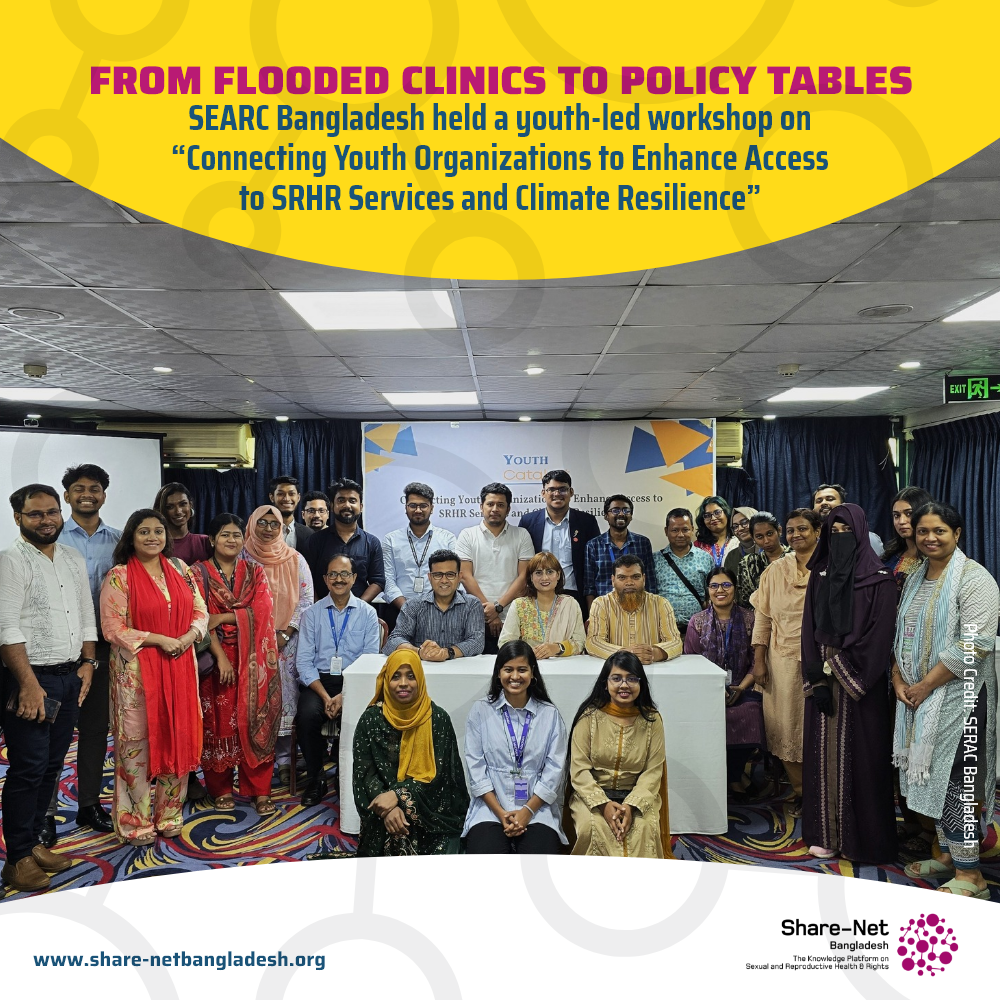From Flooded Clinics to Policy Tables: SERAC Bangladesh held a youth-led workshop on “Connecting Youth Organizations to Enhance Access to SRHR Services and Climate Resilience”
In a powerful gathering that amplified youth voices from climate-vulnerable communities across Bangladesh, SERAC-Bangladesh recently hosted a high-impact national workshop on “Connecting Youth Organizations to Enhance Access to SRHR Services and Climate Resilience” to explore the crucial intersection between Sexual and Reproductive Health and Rights (SRHR) and climate resilience.
Held under the broader framework of the Youth Catalyst initiative, and supported by UNFPA Bangladesh and the Swedish InternFrom Flooded Clinics to Policy Tables: SEARC Bangladesh held a youth-led workshop on “Connecting Youth Organizations to Enhance Access to SRHR Services and Climate Resilience”ational Development Cooperation Agency (SIDA), the event brought together dozens of youth-led and youth-focused organizations to bridge two urgent development priorities: bodily autonomy and climate justice.
Why SRHR and Climate?
As Bangladesh experiences escalating climate disasters—from salinity intrusion in Satkhira to riverbank erosion in Kurigram—access to essential SRHR services like maternal care, family planning, and menstrual hygiene becomes even more restricted. According to UNFPA’s 2024 report, climate-induced crises disrupt SRHR services for millions, disproportionately affecting adolescent girls and women in remote and coastal areas.
Workshop Highlights
Participants engaged in several innovative and participatory sessions designed to strengthen youth leadership in SRHR and climate work, including:
-
Collaborative resource and service mapping: Youth leaders pinpointed existing gaps in sexual health resources during climate emergencies.
-
Experience-sharing sessions: Stories from the ground—like youth-led mobile menstrual kits during floods—offered practical solutions.
-
SWOT analysis: Participants explored strengths, weaknesses, opportunities, and threats in current youth-led initiatives.
-
Roadmap to policy: A key outcome was drafting a youth-centered national action plan and policy position paper, aimed at integrating SRHR into climate adaptation strategies.
Speaking at the event, Dr. Muhammad Munir Hussain, Program Analyst at UNFPA Bangladesh, noted, “If we don’t prioritise young people’s SRHR in climate policy, we’re simply ignoring the most vulnerable.”
Voices from the Frontline
Participants like Tanjina, a 23-year-old youth advocate from Barisal, shared how during last year’s cyclone, “our local health center shut down, and girls had no access to sanitary pads or contraceptives for weeks.” Her team now runs peer-led awareness programs combining SRHR education with disaster preparedness.
Policy Meets Practice
With national SRHR service coverage still under strain—only 58.3% of women using modern contraception (BDHS 2022)—youth-led initiatives like these are not just innovative but essential. The roadmap developed at this workshop will directly inform upcoming national-level policy dialogues and advocacy efforts.
This workshop was more than just a conference; it was a call to action. A reminder that climate resilience must include SRHR to be truly people-centered and gender-just.
Source: SERAC Bangladesh

